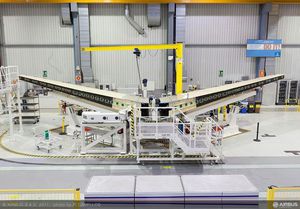On December 5th, the final workshop of the Cenit TARGET project was held at AIRBUS premises in Getafe (Madrid). This research project, focused on smart and environmentally sustainable technologies for the production of structures made of composite materials, has been founded by the CDTI (Centro de Desarrollo Tecnológico Industrial), organism depending of the Spanish Ministry of Economy and Competitiveness.
 Airbus facilities in Getafe (Madrid)
Airbus facilities in Getafe (Madrid)
The event highlighted the main achievements reached by the 12 partner companies: Airbus Operations, Acciona Infraestructuras, Aernnova, Applus, Aciturri, Airbus Defence & Space, Hexel, Idec, MTorres, Sairem Ibérica, Tecnatom y TR Composites, along with 24 research organizations (Universities and Technology Centres).
Among them, CIDAUT has worked jointly with Aciturri in research activities to promote the development of advanced liquid composite moulding processes, seeking to reduce cycle times, energy consumption, scrap material and manufacturing costs associated to the production of structural components in Aeronautics, while improving product quality and increasing process robustness and repetitiveness. Processes that, if automated, would allow the effective production of complex structural components and the optimization of structures assembly.
The TARGET project, which commenced in 2010 with a 30 million Euros budget, was divided in nine work packages with the objective of researching and developing new smart and environmentally sustainable technologies for the production of composite structures. In particular, the research activities are focused on materials and processes that avoid using large autoclaves, and on functions integration; laying ground for new equipment and automation concepts that should lead to major cost savings.
TARGET main outcomes that deserve mention are: the development of advanced compaction and curing technologies of thermoset and thermoplastic materials out of autoclave; nanomaterials processing for their optimized integration in aeronautic laminates; the research in advanced resin infusion technologies and 3D carbon fabrics optimization; the development of new non-destructive inspecting techniques prior to curing; and the definition of integrated production systems, both in situ and in line, for the efficient manufacturing of composite components and structures.